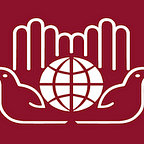Canisius Gallery Presents: Aftermath, A Narrative on Resiliency in Syria by Bassam Khabieh
The IIHA Canisius Gallery presents Aftermath by award-winning photographer Bassam Khabieh, a narrative on the resilient Syrians of Eastern Ghouta who persist amidst a volatile reality. The exhibition highlights resiliency through an assortment of human actions: first responders searching through rubble for survivors, children playing on makeshift merry-go-rounds made of remnant mortar shells, and school children studying in classrooms damaged by airstrikes.
When Syrian government forces target civilians in Eastern Ghouta with rockets containing nerve gas, killing more than 1,500 men, women, and children sleeping in their homes, the cruelty is hard to fathom. IIHA wants to use photography to illuminate, educate, and provoke a discussion of resilience in Humanitarian affairs through the Canisius Gallery. This space seeks to bring the Fordham community closer to these injustices experienced by our fellow global citizens.
During the following five years of siege, residents of Eastern Ghouta began to accept that the world would not intervene to stop this war. People proceeded with their lives, showing the resiliency of their spirits. They married, had children, and tried to rebuild what the war destroyed. Bassam Khabieh was there to capture their new lives. Khabieh is a 28-year old, self-taught, Syrian photojournalist covering daily news stories and events for Reuters in the Damascus countryside. His photos give us an intimate insight into how it feels to live in a war zone and among the attacks.
Brendan Cahill, Executive Director of the Institute of International Humanitarian Affairs, sought his work for this reason:
“It’s a great honor to show the work of Bassam Khabieh. Khabieh bears witness to chaos and death and yet his photographs have great sensitivity and gentleness. Perhaps the most touching, for me anyway, are not those that address that endemic violence head on, but rather those that show the results of that, the eyes of a child growing up every day within the violence, the meal celebrated within the rubble, the boy kicking the ball higher than the bombed buildings. Khabieh memorializes humanity in inhumane conditions.”
Despite these conditions, people fight to maintain their way of life; students clean the debris off their school desks before class; women insist on opening special centers for literacy; doctors build underground hospitals to avoid the continued targeting of medical facilities. In Eastern Ghouta, living life by creating new methods of survival constitutes a noble resistance to death. The miracle and art of these photos is that, among the rubble, they capture joy, laughter, and beauty.
The Institute of International Humanitarian Affairs presents this exhibition to testify to Bassam’s illustration of the power of the human spirit and to ensure that the human rights abuses that are portrayed do not go without witness.
Special thanks to the Oak Institute of Human Rights and Colby College, from whom this exhibition was borrowed.
Written By: Jeffrey Paddock, Marketing & Communications Graduate Assistant, Institute of International Humanitarian Affairs
About the IIHA
The Institute of International Humanitarian Affairs (IIHA) prepares current and future aid workers with the knowledge and skills needed to respond effectively in times of humanitarian crisis and disaster. Our courses are borne of an interdisciplinary curriculum that combines academic theory with the practical experience of seasoned humanitarian professionals. The IIHA also publishes on a wide range of humanitarian topics and regularly hosts a number of events in the New York area, including the annual Humanitarian Blockchain Summit and Design for Humanity Summit.
For more information or media inquiries, please contact: Camille Giacovas, Communications & Research Officer, cgiacovas@fordham.edu
